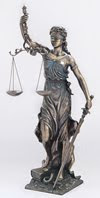There’s a court case developing in Illinois which bears scrutiny as a judge contemplates the admissibility of hearsay evidence in the trial of Drew Peterson. I’m sure the story will be covered on most of the new services; but the one I’ll refer to came from the Fox website, Victim to Speak ‘From the Grave’ in Peterson Case.
“The hearing is expected to provide the first detailed look at evidence prosecutors contend ties Peterson to Savio's death. It stems from a state law that allows a judge to admit hearsay evidence -- testimony from witnesses who recount what they heard from others -- in first-degree murder cases if prosecutors can prove a defendant killed a witness to prevent him or her from testifying.”
“The Illinois Legislature passed the law after authorities named Peterson a suspect in the 2007 disappearance of his fourth wife, Stacy, then exhumed the body of Savio, his third wife, and reopened the investigation into her 2004 death. Though the bill's sponsors were careful never to link the law publicly to Peterson, it has been referred to as "Drew's Law," and his attorneys have long suggested it was passed to put Peterson behind bars.”
Does anyone, other than an old retired cop, see a problem with skirting evidentiary principles in order to obtain a conviction? In another reality, one of the reasons for not using hearsay evidence is to protect the judiciary process which gives defendants the opportunity to cross examine witnesses directly in the courtroom. The very nature of hearsay evidence precludes open rebuttal of damaging evidence which, once a jury hears and contemplates, can never be discounted as part of the decision making task in determining guilt or innocence based on the standard ‘beyond a reasonable doubt’.
Regardless of the outcome of the Drew Peterson trial, if hearsay evidence is given the light of day in open court, the appeals process will, out of necessity, end up in the Supreme Court. The right to a fair and impartial trial hangs in the balance for each and every individual American citizen. It would be better for a guilty man to be set free than to destroy the integrity of our judicial foundations through the enlistment of improper evidence. ( Somebody needs to explain the term “slippery slope” in the comment section or I’ll be disappointed)

2 comments:
Ja! No hearsay evidence can be heard because people can be bribed, tortured, or coerced, into any statement.
"This bill and the foregoing remarks of the majority remind me of an old Arabian proverb: "If the camel once gets his nose in the tent, his body will soon follow." If adopted, the legislation will mark the inception of aid, supervision, and ultimately control of education in this country by the federal authorities." Barry Goldwater.
I use Camels nose as a metaphor to slppery slope because I had seen it compared that a way.
The answer is there can be no hearsay heard in a courtroom.
Post a Comment